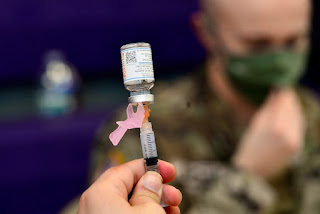While 94% of Air Force personnel are vaccinated - by order - several thousand remain defiant.
Most US military personnel have complied with the vaccination mandate. This action suggests that the services may use this as a means of weeding out those who are proving reluctant to obey orders generally. JL
Alex Horton and Timothy Bella report in the Washington Post:
The Air Force removed 27 people for not obeying orders to get vaccinated against the coronavirus. 94% of the Air Force is fully vaccinated, according to the service’s data. But tens of thousands of active-duty members across all services have declined the vaccines, a show of defiance in a culture built around following orders. The number of active-duty U.S. military personnel declining to be vaccinated against the coronavirus by their deadlines is approaching 40,000. Defense Secretary Lloyd Austin “expects 100 percent” compliance.Air Force spokeswoman Ann Stefanek acknowledged that those dismissed Monday were the first active-duty Air Force members to be discharged over the Pentagon’s vaccination requirements for military members.
No other military service has reported discharges over vaccine refusal. The Air Force, which had the military’s earliest deadline to get vaccinated on Nov. 2, was the first service to begin separation proceedings. The Army’s deadline is Wednesday.
The more than two dozen dismissed service members were discharged for not obeying a lawful order, according to Stefanek, and none had sought any type of exemption. All those discharged had less than six years of service, Stefanek said.
The number of active-duty U.S. military personnel declining to be vaccinated against the coronavirus by their deadlines is approaching 40,000. The emergence of the virus’s omicron variant has brought added concern. Although omicron appears to cause less severe illness than earlier variants, it is more resistant to the two-dose Pfizer-BioNTech vaccine widely used in South Africa, according to the first major private study since omicron was first detected last month.
While military analysts have characterized the number of refusals and holdouts as a troubling indicator, the pushback from some service members also suggests that the nation’s divisive politics have influenced a small but significant segment of the armed forces, historically an apolitical institution.
“We know there’s some more work to do,” Pentagon spokesman John Kirby told reporters last week.
Defense Secretary Lloyd Austin, who four months ago mandated vaccination for every service member, “expects 100 percent” compliance, Kirby said.
Austin said over the summer that requiring vaccination was necessary to protect the military and the country. He added that “mission-critical inoculation is almost as old as the U.S. military itself,” a reference to the efforts of Gen. George Washington to quell smallpox within Continental Army ranks by infecting troops with a less-deadly form of the disease.
Austin has received pushback from Republican critics such as Oklahoma Gov. Kevin Stitt and state Attorney General John M. O’Connor, who filed a federal lawsuit challenging the military mandate for the state’s National Guard. Stitt has argued that Austin overstepped his constitutional authority and that the defense secretary has rejected the Oklahoma governor’s request to exempt his state’s members from the mandate.
More than 3,200 airmen across active duty, the Air National Guard and Air Force Reserve have refused the vaccine, according to the data, and more than 10,500 have sought religious exemptions. None of the services have approved religious exemptions, which are exceedingly rare, defense officials have said. Few permanent medical waivers have been approved.
Vaccination deadlines have varied throughout the military. Members of the Navy and the Marine Corps had until Nov. 28 to get the shots, and active-duty Army soldiers have until Wednesday. Those with the Army National Guard and Army Reserve have until June 30, 2022, to be vaccinated, the longest lead time of any part of the military.
The Air Force previously forced out about 40 recruits for vaccine refusal during initial training before they officially began their careers. The service emphasized in a statement last week that those who refused the shots would face disciplinary action such as discharge without involuntary separation pay.
“For those who refused to obey a lawful order to receive the covid-19 vaccine, commanders will continue to take appropriate administrative and disciplinary actions consistent with law and Department of the Air Force policy,” the service said in a statement.
About 1,800 airmen were discharged for various issues in the first three quarters of this year. It is not clear how many others are in the separation process for vaccine refusal, Stefanek said.
The Air Force is reviewing thousands of appeals from airmen who declined to be vaccinated on medical or religious grounds. The branch has granted roughly 1,200 total medical and administrative exemptions to active-duty service members. The vast majority of the medical exemptions are temporary, Stefanek said. Other services have granted just a handful of permanent medical exemptions.
The dismissed airmen on Monday received either honorable discharges or general discharges under honorable conditions, according to the Air Force. The latter means that they probably had other blemishes on their record. Such a discharge can prohibit them from using the GI Bill, which helps veterans pay for college and training programs.




















0 comments:
Post a Comment